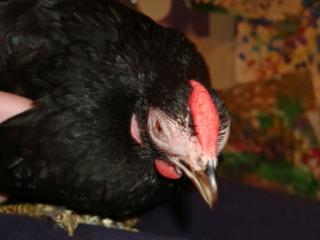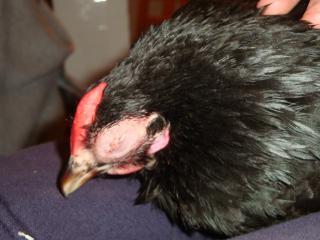Hi, I'm completely new to chickens. My kids wanted to raise chickens to show at the fair for 4-H, so we went to a poultry show and bought 4 bantams: 2 Wyandottes, 1 Rhode Island Red, and 1 Phoenix. We didn't have a coop yet, so we housed them in a large cage, with pine shavings, in the kitchen. (Didn't know what a mess that would be!) We have a lot of raccoons in our area so I didn't want to put the cage outside unprotected.
About 4-5 days later, the Phoenix had one eye swollen shut. We separated her, and brought her to our 4-H poultry leader. She got the eye open with a wet paper towel and removed a firm yellow chunk of something that smelled infected. We cleaned the eye and put some Neosporin in it. She then commented that it sounded like the hen had a breathing problem, she made sort of a congested bubbling sound -- I thought it sounded a bit like a loud purring noise, but apparently chickens don't purr... She told us to keep her separated and see what happens. Two days later, the eye was completely better and she seemed healthier, although still made the strange sound. About a week later, she was laying eggs and seemed eager to get out of her little cage and move around, so we put her back in with the others.
About 5 days later, one of the Wyandottes had a swollen eye and was sounding congested. We immediately removed her and put her into the isolation cage (the others were in a small coop outside by this point) but I didn't think to change the shavings out completely. I bathed the eye and put Neosporin in it, like I did the last time, put Vet RX on her beak and ACV in her water. (Read that on this forum.) Several days later now, her eyes are both still wanting to close, she sleeps a lot, and now isn't eating much. Her eyes seem a bit watery too, and sometimes she breathes with her beak open. I've been reading a lot, and now I'm scared that it's something bad... and that they're all at risk or too late to help. Is there ever a chicken disease that isn't terrible news? I got some Sulmet and put it in her water, I'll do the same for the rest in the morning.
I'd love some input, as I really don't know anything about chickens. I really thought that it was going to be a nice little easy project for the kids, but so far it's not working out like I'd hoped. Thanks for any advice.


About 4-5 days later, the Phoenix had one eye swollen shut. We separated her, and brought her to our 4-H poultry leader. She got the eye open with a wet paper towel and removed a firm yellow chunk of something that smelled infected. We cleaned the eye and put some Neosporin in it. She then commented that it sounded like the hen had a breathing problem, she made sort of a congested bubbling sound -- I thought it sounded a bit like a loud purring noise, but apparently chickens don't purr... She told us to keep her separated and see what happens. Two days later, the eye was completely better and she seemed healthier, although still made the strange sound. About a week later, she was laying eggs and seemed eager to get out of her little cage and move around, so we put her back in with the others.
About 5 days later, one of the Wyandottes had a swollen eye and was sounding congested. We immediately removed her and put her into the isolation cage (the others were in a small coop outside by this point) but I didn't think to change the shavings out completely. I bathed the eye and put Neosporin in it, like I did the last time, put Vet RX on her beak and ACV in her water. (Read that on this forum.) Several days later now, her eyes are both still wanting to close, she sleeps a lot, and now isn't eating much. Her eyes seem a bit watery too, and sometimes she breathes with her beak open. I've been reading a lot, and now I'm scared that it's something bad... and that they're all at risk or too late to help. Is there ever a chicken disease that isn't terrible news? I got some Sulmet and put it in her water, I'll do the same for the rest in the morning.
I'd love some input, as I really don't know anything about chickens. I really thought that it was going to be a nice little easy project for the kids, but so far it's not working out like I'd hoped. Thanks for any advice.


